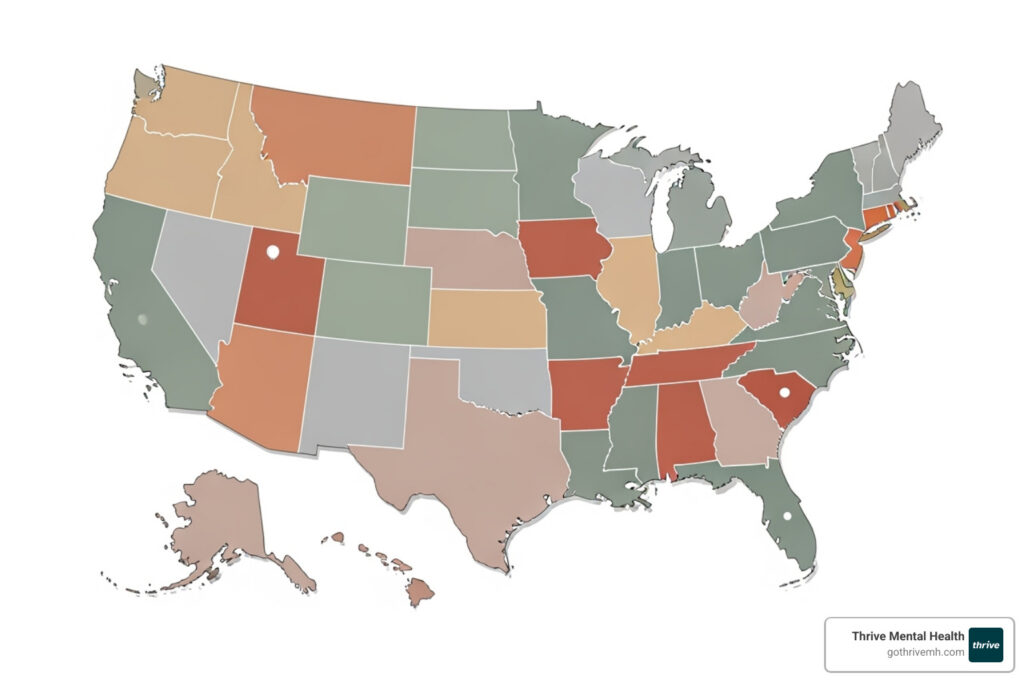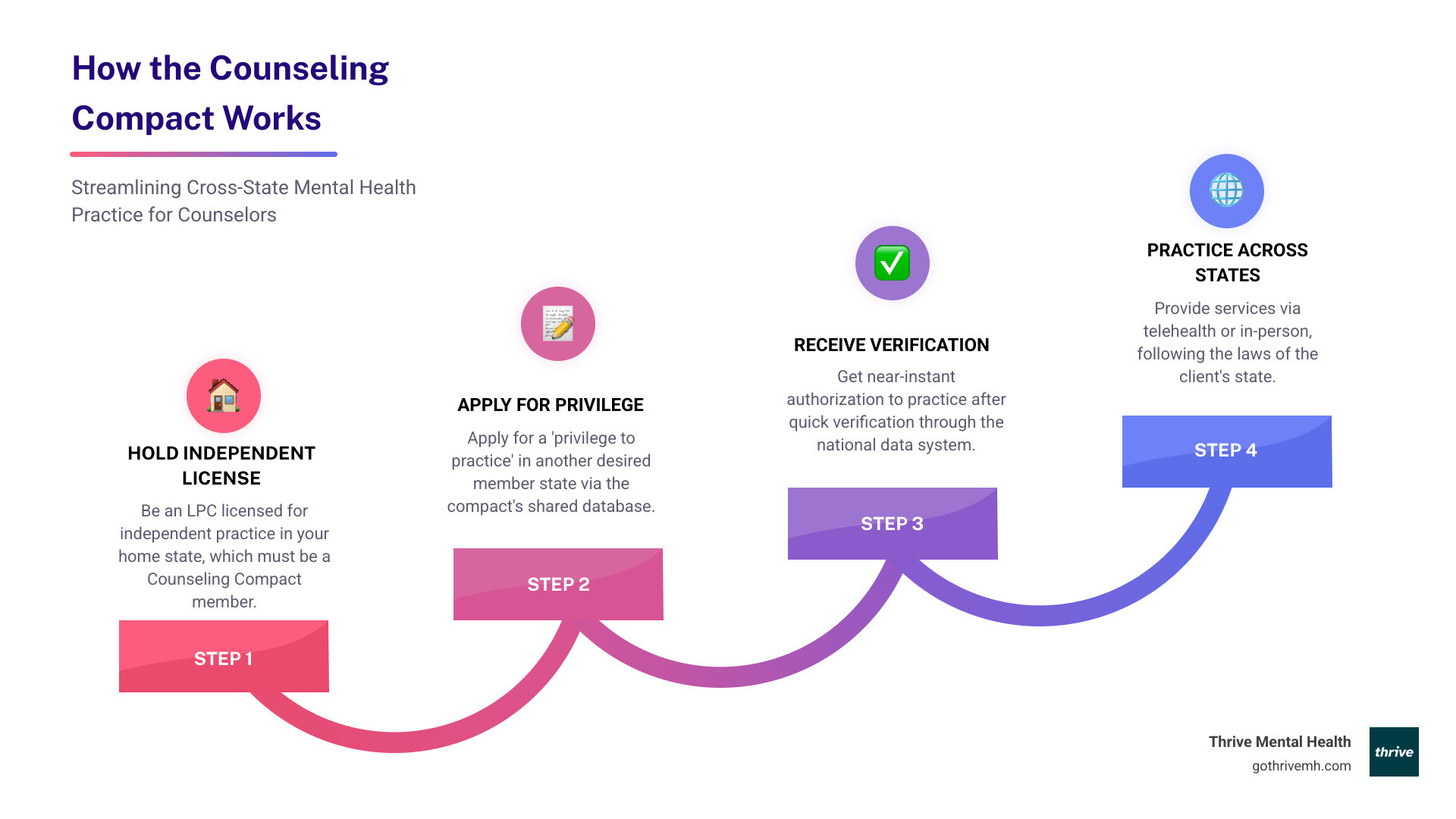The Definitive Guide to Counseling Compact

Counseling Compact: 2025 Definitive Guide
Counseling Compact 2025: Keep Your Therapist Across 39 States in Minutes—Skip Months of Licensing
The Counseling Compact is an agreement among 39 states and Washington, D.C. that allows licensed professional counselors (LPCs) to practice across state lines without getting multiple licenses. Instead of lengthy state-by-state applications, eligible counselors can apply for a “privilege to practice” in other member states in minutes.
Quick Facts:
- What it is: An interstate agreement for license recognition.
- Who can use it: LPCs licensed for independent practice in a member state.
- How it works: Apply for a “privilege to practice” in other member states via a shared database.
- Current reach: 39 states + D.C. (as of 2025).
- Timeline: Live in Arizona and Minnesota; Florida and other member states implementing by Fall 2025.
- Not included: California, Texas, and 10 other states (yet).
The compact makes it easier to keep your therapist if you move, travel, or live in multiple states. It also expands your options for finding specialized care, so you aren’t limited to counselors licensed only in your current state. For counselors, it cuts an administrative process that took months down to minutes.
With surging demand for mental health care and 122 million Americans in counselor-shortage areas, the compact helps close the gap by enabling telehealth across state lines.
I’m Anna Green, LMHC, LPC, Chief Clinical Officer at Thrive Mental Health. As a counselor licensed in Florida and three other states (IN, AZ, SC), I’ve seen how the Counseling Compact transforms access to care for our clients.

What is the Counseling Compact and How Does It Work?
The Counseling Compact is an interstate agreement that cuts the red tape of practicing across state lines. Each member state passes the same law, creating a unified system for licensed professional counselors (LPCs) to work in multiple states without getting a new license each time.
The compact uses a mutual recognition model. Instead of state-by-state licensing, member states agree to grant a “privilege to practice” to eligible counselors from other member states. This isn’t a second license, but a legal authorization to provide services, backed by your home state license.
A shared data system connects all member states, instantly verifying your credentials, license status, and disciplinary history. This turns a months-long process into minutes, which is a game-changer for telehealth. It allows you to continue with your therapist even if you move or travel. (See how this works in our virtual IOP programs.)
The system is designed to improve counselor mobility, expand client access to care, and reduce administrative burdens.
Counseling Compact vs. Traditional Reciprocity vs. Endorsement
Understanding the difference between the compact and older methods like reciprocity and endorsement is key.
- The Counseling Compact: Grants a “privilege to practice” in member states via a near-instant, standardized process. You keep one home state license and apply for privileges through a shared database.
- Traditional Reciprocity: Formal agreements between specific states to accept each other’s licenses. True reciprocity is rare for counselors, and it still requires applying to each state’s board for review.
- Endorsement (Licensure by Endorsement): The historical standard. You apply for a new license in a new state by proving your qualifications meet their specific standards. This involves submitting transcripts, supervised hours, and exam scores, a process that can take months and cost hundreds of dollars if requirements don’t align perfectly.
| Feature | Counseling Compact | Traditional Reciprocity | Endorsement |
|---|---|---|---|
| How it works | Grants a “privilege to practice” via mutual recognition | Bilateral agreements between specific states | Individual state evaluation of credentials |
| Speed | Near-instant through shared database | Faster than endorsement, but requires state-specific review | Lengthy—often takes months |
| Data sharing | Automatic across all member states | Limited; varies by agreement | Manual verification required |
| Your home license | Keep one home license, add privileges | May obtain a new full license | Applying for a new license |
| Current availability | 39 states and D.C. (growing) | Rare for professional counselors | Available in all states, but varies |
| Real-world example | A Florida LPC gets a privilege to practice in Arizona in minutes. | A Florida LPC applies under a specific FL-GA agreement (if one existed). | A California LPC moving to Indiana submits full credentials for review. |
The Counseling Compact bypasses the fragmented nature of reciprocity and endorsement. It creates a standardized pathway that reduces barriers, meaning less paperwork for counselors and better access to care for clients.
Who Can Participate? States & Counselor Eligibility
The Counseling Compact is expanding, but participation depends on your state and professional qualifications.
Which States Are Part of the Compact?
As of 2025, 39 states and Washington, D.C. have enacted legislation to join. However, passing the law is different from implementing the system.
- Currently Live: Arizona and Minnesota. Counselors can apply for privileges in these states now.
- Coming Soon: The system is expected to be operational in Florida and all other member states by Fall 2025.
- Not Participating (Yet): Notable states like California and Texas have not joined. If your home state is not a member, you must use the traditional endorsement process.
The following states have enacted the compact: Alabama, Arizona, Arkansas, Colorado, Connecticut, Delaware, Florida, Georgia, Indiana, Iowa, Kansas, Kentucky, Louisiana, Maine, Maryland, Minnesota, Mississippi, Missouri, Montana, Nebraska, Nevada, New Hampshire, New Jersey, North Carolina, North Dakota, Ohio, Oklahoma, Rhode Island, South Carolina, South Dakota, Tennessee, Utah, Vermont, Virginia, Washington, Washington, D.C., West Virginia, Wisconsin, and Wyoming.
For the latest information, view the official map for live updates.

Counselor Eligibility Requirements
To use the compact, you must meet specific professional standards. It is designed for counselors licensed for independent practice.
You must:
- Hold an unencumbered license for independent practice (e.g., LPC, LPCC, LMHC) in a member state that is your primary residence (“home state”). Associate-level or supervised counselors are not eligible.
- Have a master’s or doctoral degree in counseling of at least 60 semester hours.
- Have completed the supervised clinical experience required by your home state.
- Have a passing score on a national counseling exam (e.g., NCE).
- Pass a federal criminal background check.
These requirements ensure all counselors in the compact meet the same high standards, protecting clients across state lines.
Benefits, Costs, and Rules of Interstate Practice
The Counseling Compact changes how mental health care crosses state lines, creating major benefits for both counselors and clients.
Key Benefits for Counselors and Clients
- For Counselors: The compact provides license portability. Instead of a months-long application process for each new state, you can get a privilege to practice in days. This opens up new market opportunities, allows you to serve clients in underserved areas, and reduces administrative burdens.
- For Clients: The primary benefit is continuity of care. You can keep your therapist even if you move, travel for work, attend college out of state, or are a “snowbird” spending part of the year in Florida. It also provides access to specialized counselors from across member states, which is crucial if you live in an area with few mental health professionals.
- For Military Families: The compact offers significant relief for military spouses. You can designate a single home state for the duration of your spouse’s service, allowing you to maintain your career and practice in any compact state where you are stationed without re-licensing.
This flexibility is central to how we deliver care at Thrive Mental Health. Our virtual IOP programs are designed to work across state lines, meeting you where you are. We also offer PHP and virtual therapy options to fit your schedule and needs.
The Practicalities: Costs, Scope of Practice, and Discipline
Here’s what you need to know about the rules of interstate practice.
- Costs: To get a privilege to practice, you will pay a fee to the remote state (usually similar to or less than a full license fee) and a fee for the federal criminal background check. The cost is offset by the time saved, as you can expand your practice almost immediately.
- Scope of Practice: This is critical. You must follow the laws and rules of the state where your client is physically located (the “remote state”). This includes regulations on diagnosis, record-keeping, and informed consent. You also cannot exceed your home state’s scope of practice. When in doubt, adhere to the more restrictive state’s rules.
- Disciplinary Actions: Your home state retains the authority to take action against your primary license. However, a remote state can suspend your privilege to practice there and will report any issues to your home state board. The shared data system ensures accountability. If you lose your home state license, all your privileges to practice are terminated automatically.
The Future of Interstate Practice: What’s Next?
The Counseling Compact is an evolving system. Its future depends on the Counseling Compact Commission and the continued adoption by states and counselors.
The Role of the Counseling Compact Commission
The Commission is a joint public agency created by member states to manage the compact. Its key responsibilities include:
- Rulemaking: Developing the procedures and standards to ensure the compact works uniformly.
- System Operations: Building and managing the shared interstate licensure data system that makes near-instant verification possible.
- Implementation: Coordinating the rollout across all member states.
The timeline goal is to have privileges available for all compact states by Fall 2025. For those of us at Thrive Mental Health with licenses in states like Indiana, Florida, and South Carolina, this will significantly expand our ability to provide care. You can read the full compact legislation for more detail.

How to Apply and Stay Updated
Counselors in Arizona and Minnesota can apply for privileges now through the compact application portal. Authorization is often granted in minutes.
For counselors in other member states, including Florida, Indiana, and South Carolina where Thrive Mental Health operates, the full rollout is expected by Fall 2025.
To stay informed, check the official Counseling Compact website at CounselingCompact.Gov and watch for announcements from your state licensing board.
Insurance Coverage for Interstate Telehealth
While the compact provides the legal right to practice, insurance reimbursement for interstate telehealth is a separate issue. Coverage depends on the client’s plan, state regulations, and network status.
At Thrive Mental Health, we are in-network with major plans in Florida, including Cigna, Optum, and Florida Blue. Our team specializes in verifying benefits for interstate telehealth to ensure your care is covered, whether you are in Florida or another compact state. We can run a quick, no-obligation benefits check for you.
For a deeper dive into costs and coverage, see our related blog resources on virtual IOP and telehealth in our Thrive blog.
Frequently Asked Questions about the Counseling Compact
{
"@context": "https://schema.org",
"@type": "FAQPage",
"mainEntity": [{
"@type": "Question",
"name": "Can I get one privilege to practice in all compact states at once?",
"acceptedAnswer": {
"@type": "Answer",
"text": "No. A counselor must apply for a separate 'privilege to practice' for each member state in which they wish to see clients. The compact's data system is designed to make this process quick and efficient, but it is not a single, universal privilege."
}
},{
"@type": "Question",
"name": "What if my state isn't a member of the Counseling Compact?",
"acceptedAnswer": {
"@type": "Answer",
"text": "If your primary state of residence and licensure is not a member of the Counseling Compact, you are not eligible to use its benefits. You must pursue licensure in other states through their traditional endorsement or reciprocity pathways. You can advocate for your state to join by contacting your state legislators."
}
},{
"@type": "Question",
"name": "Does the compact apply to associate-level or provisionally licensed counselors?",
"acceptedAnswer": {
"@type": "Answer",
"text": "No. The Counseling Compact is only for professional counselors who are licensed for independent practice in their home state. Counselors who are still under supervision or hold a provisional or associate-level license are not eligible."
}
},{
"@type": "Question",
"name": "How much does a Counseling Compact privilege cost?",
"acceptedAnswer": {
"@type": "Answer",
"text": "Fees vary by state. Expect to pay a remote-state fee (often similar to a license application fee) plus the required federal background check."
}
},{
"@type": "Question",
"name": "Does the Counseling Compact allow telehealth and in-person sessions?",
"acceptedAnswer": {
"@type": "Answer",
"text": "Yes. You can practice via telehealth or in-person in a remote state, as long as you follow that state's laws and your home state's scope of practice."
}
}]
}
Can I get one privilege to practice in all compact states at once?
No. While the Counseling Compact streamlines the process, it does not grant a single, universal privilege that covers all member states automatically. A counselor must apply for a separate “privilege to practice” for each compact member state in which they wish to see clients. The compact’s shared data system makes this application process quick and efficient for each individual state, but it still requires a distinct application for each jurisdiction.
What if my state isn’t a member of the Counseling Compact?
If your primary state of residence and licensure is not (or not yet) a member of the Counseling Compact, you are not eligible to use its benefits. This means you cannot obtain a privilege to practice in other compact states through this mechanism. Instead, you would need to pursue licensure in other states through their traditional endorsement or reciprocity pathways, which often involve a more extensive application and review process. If you wish for your state to join, we encourage you to advocate for its participation by contacting your state legislators and informing them about the compact’s benefits for both counselors and clients.
Does the compact apply to associate-level or provisionally licensed counselors?
No, the Counseling Compact is specifically designed for professional counselors who are licensed for independent practice in their home state. Counselors who are still under supervision, completing hours for licensure, or hold a provisional, associate-level, or temporary license are not eligible to obtain a privilege to practice through the compact. The compact’s eligibility criteria emphasize independent practice to ensure a consistent standard of care across state lines.
How much does a Counseling Compact privilege cost?
Fees vary by state. Expect to pay a remote-state application fee plus the required federal background check. Most counselors find the time and cost savings significant versus pursuing multiple full licenses.
Does the Counseling Compact allow telehealth and in-person sessions?
Yes. The compact covers both, as allowed by the remote state’s laws. Always follow the rules of the state where the client is located and stay within your home state’s scope of practice.
Conclusion: Embracing a More Connected Future for Mental Health
The Counseling Compact is a fundamental shift toward accessible mental health care in America. By removing state-line barriers, it supports continuity of care for clients who move, travel, or live in underserved areas, while allowing counselors to practice where they are needed most.
This move toward a national practice model ensures a Florida college student can keep their therapist after graduation, a military family stationed at MacDill AFB can maintain care during a move, and a client in a rural part of the Panhandle can access specialized treatment from an expert states away.
At Thrive Mental Health, we believe care should adapt to your life. The compact aligns with our mission to provide flexible, expert-led virtual and hybrid programs to clients across Florida. As the compact becomes fully operational by Fall 2025, we are excited to extend this continuity of care to Floridians who travel or move, helping more people on their healing journey. The future of mental healthcare is more connected and client-focused than ever.
Ready for support? Thrive offers virtual and hybrid IOP/PHP with evening options. Verify your insurance in 2 minutes (no obligation) Start benefits check or call 561-203-6085. If you’re in crisis, call/text 988.